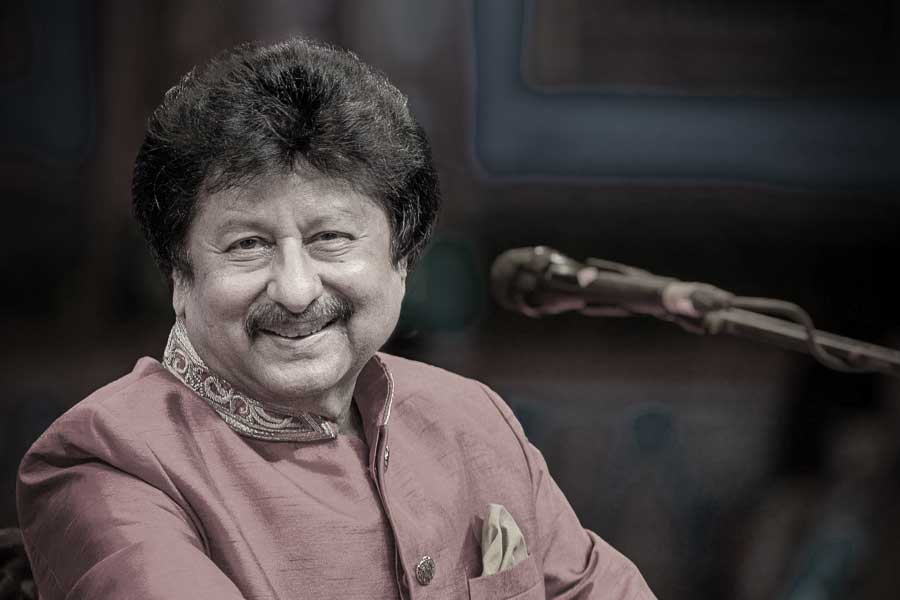Pankaj Udhas, a name synonymous with the revival of ghazal in contemporary Indian music, left the world on February 26, after a long battle with illness, in Mumbai at the age of 72. His departure marks the end of an era that saw the infusion of soulful melody into the hearts of many, especially during a time when the Indian music scene was dominated by the cinematic trope of the ‘angry young man’, draining the essence of melody from the collective consciousness. Udhas, drawing inspiration from legends like Mehdi Hasan and Jagjit Singh, played a pivotal role in rekindling the youth’s interest in ghazals, a genre that was perceived to be waning in popularity.
The approach of Pankaj Udhas to ghazals was innovative; he ventured beyond the traditional confines of the genre, making it more accessible and relatable to a wider audience. His ability to simplify the intricate Persianized Urdu poetry into verses that spoke directly to the heart was unparalleled. Songs like “Deewaron Se Milkar Rona Achcha Lagta Hai” became anthems of heartbreak and longing, showcasing his talent in touching the deepest chords of human emotion. Furthermore, he modernized the musical accompaniment of ghazals, introducing a fresher, more vibrant sound that appealed to the younger generations. This was evident in tracks like “Mohe Aai Na Jag Se Laaj” where the rhythmic breaking of ghungroos (ankle bells) metaphorically celebrated freedom and youthful rebellion.
The image of Pankaj Udhas, impeccably dressed, playing the harmonium with not a single hair out of place, and softly singing into the microphone, remains an indelible memory for those who grew up during the transition from traditional television programming to the era of music videos. His performances, particularly the gentle articulation in “Aur Ahista Kijiye Baatein”, captured the hearts of a middle-class India that was slowly opening its doors to the concept of live ghazal concerts, a testament to his widespread appeal and enduring legacy.
Among many contributions of Pankaj Udhas to music, the song “Chitthi Aayi Hai” holds a special place. Sung for the film “Naam” (1986) and composed by the renowned duo Laxmikant-Pyarelal, the song became an anthem for migrants and the Indian diaspora worldwide. Its portrayal in the film, coupled with Udhas’s emotive delivery of Anand Bakshi’s lyrics, encapsulated the universal yearning for home and belonging. Despite the advent of modern communication methods like emails and video calls, this song continues to resonate, highlighting the timeless nature of Udhas’s artistry.
Udhas’s journey in music was marked by a number of hits that catered not just to the connoisseur but also to the lay listener, creating a bridge between the classical and the contemporary. From “Purab Na Jaiyo” to “Jeeye To Jeeyen Kaise”, his voice became a vehicle for conveying a spectrum of emotions, from joy to despair, making ghazals a part of everyday life for many. His performances were not just concerts; they were an experience, transcending the mundane and touching the sublime.
Born into a family with a rich musical heritage in Rajkot, Udhas’s early life was steeped in music, his initial foray into the world of sound being through the tabla. However, his true calling was in vocal music, which he pursued under the tutelage of Ustad Ghulam Qadir Khan and later, Navrang Nagpurkar. Despite early challenges, Udhas found his niche in non-film ghazals, achieving instant success with albums like “Aahat” and “Mehfil”. His work often explored themes of love and longing, using the metaphor of wine and taverns to delve into the deeper aspects of human emotion and spiritual yearning.
Despite criticisms for allegedly glorifying alcohol through his music, Udhas maintained that these were symbolic of the intoxicating nature of divine love, a common theme in Sufi poetry. His global appeal was undeniable, with performances at prestigious venues like the Royal Albert Hall in London and Madison Square Garden in New York, underscoring his status as a cultural ambassador for ghazal music.
Pankaj Udhas’s legacy is not just in the melodies he left behind but in the way he transformed ghazal, making it a living, breathing part of India’s musical landscape. His songs continue to inspire and console, a testament to the power of music to transcend barriers and touch souls. As we remember Udhas, we celebrate not just a singer, but a poet, a storyteller, and an icon whose contributions to music will be cherished for generations to come.
